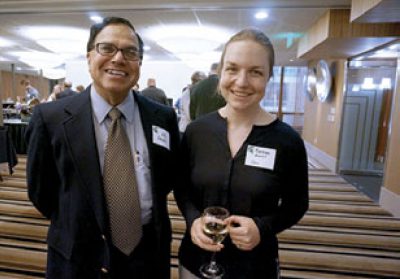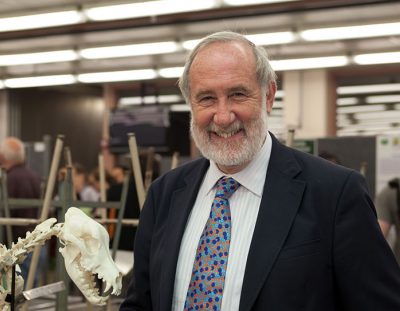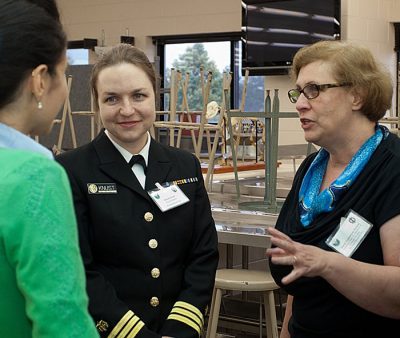Introducing students to a world of research possibilities

Veterinary students looking to develop their research skills and connect with leaders in their field have an excellent opportunity through a distinctive program at MSU.
The Summer Research Program of the College of Veterinary Medicine at Michigan State University, provides intensive, mentored summer research opportunities for DVM, and undergraduate students. The program culminates in the College of Veterinary Medicine Phi Zeta Research Day each October. Phi Zeta is the honorary society of veterinary medicine. Participants present their research, either orally or with a poster, and awards are given for scholarship and presentations in various categories. The day also features presentations by graduate students and faculty members, and a keynote speaker, usually an established researcher from outside the university. This year, the keynote speaker was Dr. Barbara Knust, DVM, MPH, DACVPM, and CVM alumnus of the class of 2004, who is currently the lead scientist at the Viral Special Pathogens Branch at the Centers for Disease Control and Prevention, in charge of the response to the Ebola outbreak. Dr. Knust herself was a participant in the Summer Research Program at MSU in 2002.
"The educational value of Phi Zeta Research Day is very significant," says Vilma Yuzbasiyan-Gurkan, associate dean for research and graduate studies and longtime director of the summer research program. "Our profession is science-based; these students are in the lab or clinic, working on some question of importance. One of the most powerful things for our students is to see the accomplishments of their peers, as well as that of our keynote speaker."
"The day is a way for us to look at the cutting-edge research across our mission, across our departments," she adds. "It's really a showcase of our current work. We learn from each other and are inspired by each other. That's true of students and faculty. It's a very inspiring day."

Summer research programs are present at colleges across the country, but MSU's program is one of the largest and most robust. Admission to the 12-week research program is competitive, with about 30 DVM students and 8 undergraduate students being ultimately accepted. The undergraduate portion of the program is specifically funded by NIH to introduce students from underrepresented groups to research and is co-directed by Drs. Susan Ewart and Vilma Yuzbasiyan-Gurkan.
Most of the program's funding comes from the National Institutes of Health and the Merial Veterinary Scholars Program. The university and endowments provided by College alumni provide additional funding.
Participants must be available 40 hours a week for the program. Many of them travel after completing their project to the Merial-NIH National Veterinary Scholars Program Symposium, an annual gathering of summer research participants from around the country. Each year, several students go on to publish the results of their work, Yuzbasiyan-Gurkan says.
"Some students see their participation in Phi Zeta as the highlight of their experience [at the College]," she says. "They're bringing an idea from inception to something that they can indicate is a clear result of their work. They get that satisfaction of contributing to the field's knowledge base. It gives them insight into what they can do with their veterinary education."

Brakel gave an oral presentation of her research at Phi Zeta Day in 2013, and qualified for the best oral presentation by a DVM student award.
"I was very nervous about it because I'm very nervous about public speaking in general," she says. "But it was definitely a good experience, and it's been easier to speak in public since."
That's good, because her opportunities for publicly presenting her research have multiplied. Brakel presented a poster at a conference of the American Society of Microbiologists, and at the Merial-NIH National Veterinary Scholars Program Symposium.
At the conference for the American Society of Microbiologists, Brakel says, "there were all these real scientists there. I got to talk to a bunch of people doing similar work from around the world, to exchange notes and talk about what we're working on. It was really, really neat."
Brakel says she didn't expect the program to pay off as thoroughly as it has for her—finding a new career direction, mastering public speaking and connecting with colleagues across the country.
"I expected to be something I did my first summer, and then to find something else second summer," she says. "If it didn't exist, I wouldn't have had a venue through which to pursue research. The summer research program gives you a more structured way to say, 'I'm interested in research, but I don't really know who to talk to.' It helps you out, just finishing your first year and not knowing a lot of people. Even if you think you're not interested, it's worth trying it because you never know where it will take you."
Among the participants this year is Kelsey Brakel, a third-year DVM student. Brakel had developed an interest in research as an undergraduate student and decided to explore Phi Zeta for the summer following her first year. Accepted applicants are referred to two or three possible mentors, with whom they then interview. Both student and faculty member must agree that the match is a good one in order to begin working together.
Brakel was matched with Professor Linda Mansfield in the departments of large animal clinical sciences and microbiology and molecular genetics.
"I knew I was interested in genetics and the interface between human and animal medicine, and in pathology," Brakel says. "The committee did a really good job of matching me."
Brakel worked with Mansfield on an animal model of Guillain-Barré syndrome as a result of Campylobacter jejuni infection. Results of the immunological tests on the model she was investigating got promising results.
"Based on the results, we thought it could really be something, and we were able to design a second experiment," she says. She applied to the program for a second year to continue the research. She was nominated for special funding through the AVMA and was awarded the 2nd Year Participation fellowship.
Mansfield, she says, struck the right balance of providing guidance and giving her the room to learn how to conduct research. After completing her first summer in the program, Brakel says, "I realized I enjoyed the entire research process. It was exciting to be doing this work and actually get results that were telling us something important, that I realized I wanted to get my PhD."
